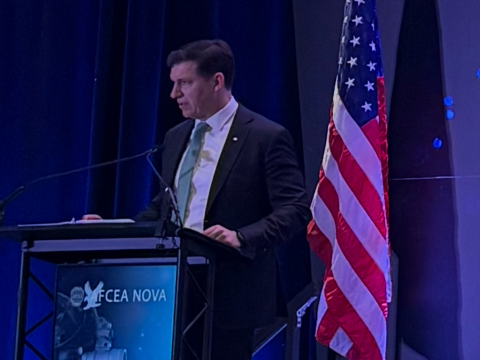Incoming: Are Politics Impeding Our National Security?
I am convinced that we will continue to struggle against extremist and other mass-murder threats until we come up with unified national positions on terrorism and gun control that most Americans can understand, accept and support. We need a strategy that targets these threats using every element of national power: diplomatic, informational, military and economic.
The steady drumbeat of horrific terrorist attacks continues across our country and around the world. Most of these attacks are rooted in religious extremism, yet our administration and Congress keep debating terrorism terminologies and causes rather than taking aggressive and meaningful bipartisan steps that clearly identify the threats and lay out a comprehensive strategy to mitigate them. I am convinced that we will continue to struggle against extremist and other mass-murder threats until we come up with unified national positions on terrorism and gun control that most Americans can understand, accept and support. We need a strategy that targets these threats using every element of national power: diplomatic, informational, military and economic.
We should start by agreeing on a standard lexicon to describe different types of terrorist acts and mass killings. Once we have characterized an event, we should appoint the right lead agency to coordinate actions tailored to the particular threat.
We all agree that innocent people were senselessly slaughtered in Aurora, Colorado; Newtown, Connecticut; and Charleston, South Carolina. Yet we failed to collectively acknowledge the differences between those events and other attacks in Fort Hood, Texas; San Bernardino, California; and Orlando, Florida. Characterizing each attack accurately, with a plausible cause, such as psychopathy, hate or religious extremism, will remove some of the friction that surfaces after these events and help define a unified response. Our leaders can help by refusing to lay blame immediately after an event, which will allow experts time to identify a root cause. Democrats and Republicans could hold joint press conferences to reinforce that mass killings are a national issue, not a party issue. This would reduce the parties’ division on these matters and help ensure that appropriate actions are taken to prevent recurrences.
Too often, our responses result in more divisiveness and single-party legislation. Neither side succeeds, and the politics seem petty. More troubling is that the country still loses. We need passage of meaningful legislation to address terrorism and other national security issues, such as gun control, and we need it to cross the aisle. I believe both parties would benefit in the eyes of their moderate constituents by finding and passing reasonable legislation that addresses security and safety issues.
Although I do not believe that stricter gun laws will prevent terrorism, I do believe we should make access to weapons very difficult for individuals who have been identified as security risks. It seems reasonable that if a person is on a no-fly list, that individual should be subject to close scrutiny before being allowed to buy a weapon. Additionally, we should take a look at the ease with which the public can access semi-automatic weapons. I own guns and support the Second Amendment, but I cannot imagine needing vast amounts of firepower for protecting my family or hunting. I recognize that this is just one man’s opinion and that there are many other opinions, so let’s have an open, civil debate that seeks common ground.
When terrorist acts are motivated by religious extremism, the government must not shy away from saying so. While I agree that we should never paint an entire group with one brush, we should acknowledge that subcultures exist within almost every organization. The Islamic State has declared war on the West, and we should not hesitate from calling out this enemy as a radical Islamic extremist group. This will help codify our counterterrorism endeavors to defeat these groups and further unite the international efforts of countries that are looking for greater leadership from the United States. It also could provide a better platform for the moderate Muslim majority to speak out against those who have hijacked their religion. Ensuring that the moderate Muslim community is part of the effort to defeat this form of terrorism is essential.
The world is a more dangerous place since September 11, 2001, and terrorists like it that way. However, not every terrorist act is religiously motivated, and not every terrorist act can be prevented by making gun laws so restrictive that U.S. citizens lose their right to bear arms. We need a united leadership team in Washington to develop a cohesive bipartisan national strategy on terrorism and other national security issues. We need our leaders to propose and pass comprehensive legislation that makes our country safer from terrorists. This takes statesmen and stateswomen who put the good of the general population above all else. We have faced serious threats before and have risen to the occasion. I have faith that, with more united leadership, we can do it again.
Lt. Gen. Mike Basla, USAF (Ret.), the former chief of information dominance and chief information officer of the U.S. Air Force, is a senior vice president and Air Force client executive for CACI. The views expressed are his alone and do not necessarily reflect the views of CACI, the U.S. Air Force or AFCEA International.




Comment
Lt. Gen Basla, August Incoming Article
Right on target and well said!
Comments